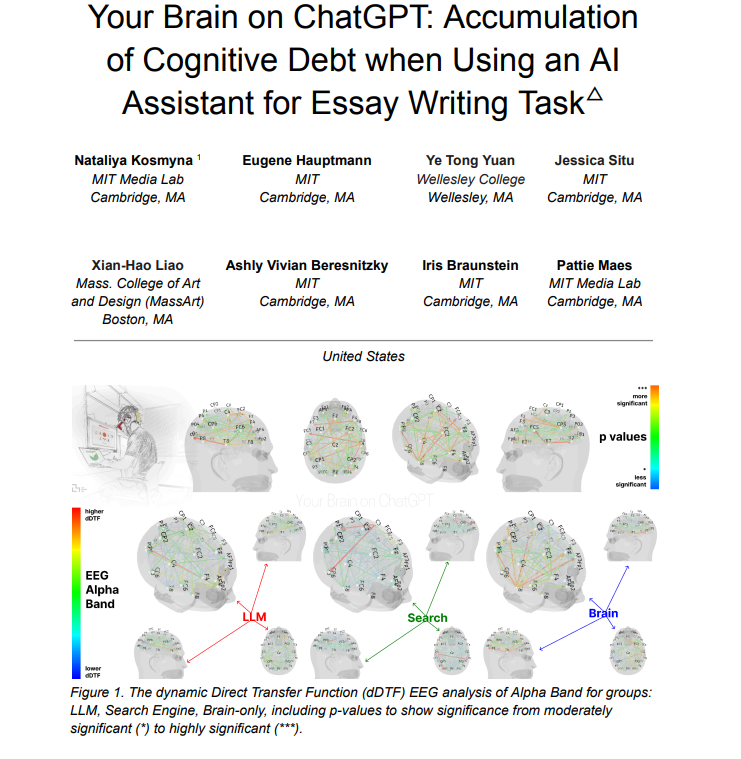The widespread adoption of large language models (LLMs) like ChatGPT raises important questions about their effects on human learning and thinking. This study focuses on measuring the cognitive cost of using AI for a specific task: essay writing.

Study Design
Participants and Procedure
The study assigned 54 participants to three main groups:
-
LLM group: Used ChatGPT to write essays
-
Search Engine group: Used traditional search engines (e.g., Google)
-
Brain-only group: Wrote essays solely from their own knowledge, with no external tools
Each participant wrote three essays across three sessions. In a fourth session:
-
LLM-to-Brain: Participants who had used LLMs wrote without tools
-
Brain-to-LLM: Participants who previously wrote unaided switched to using an LLM
Essay topics were selected from SAT-like prompts.
Measurement Methods
-
EEG (electroencephalography): Used to monitor brain activity and track engagement across different brain regions
-
NLP analysis: Evaluated vocabulary, structure, and linguistic diversity
-
Interviews: Conducted after each essay session
-
Scoring: Performed by both human instructors and a specialized AI grading agent
Key Findings
1. Brain connectivity decreases with increased reliance on tools
-
The Brain-only group exhibited the strongest and most widespread neural network engagement
-
The Search Engine group showed moderate brain activity
-
The LLM group had the weakest connectivity, indicating lower cognitive engagement
2. Cognitive debt surfaces when switching from AI to unaided writing
-
Participants in the LLM-to-Brain group displayed reduced neural connectivity, especially in the alpha and beta bands
-
They struggled to recall or quote from essays they had just written and expressed a low sense of authorship
3. Increased engagement when switching from unaided writing to AI
-
Conversely, Brain-to-LLM participants re-engaged key brain regions—particularly those related to visual processing and decision-making
-
These individuals integrated information more effectively and demonstrated higher memory recall
Linguistic and Scoring Results
-
LLM-generated essays showed less diversity in vocabulary (NERs, n-grams) and often resembled ChatGPT’s default responses
-
Brain-only essays were more diverse, well-structured, and better supported with evidence
-
While the LLM group scored relatively high at first, their performance declined over time, especially in session 4
Educational Implications
The study reveals that relying on LLMs can negatively impact actual learning abilities, even though they may seem helpful at first. Participants who consistently used AI showed signs of dependency, including:
-
Reduced cognitive engagement
-
Lower memory retention
-
Weaker sense of content ownership
-
Less efficient brain connectivity
Conclusion
The use of AI tools like ChatGPT in educational settings must be approached with care. This research provides clear linguistic and neurological evidence that overreliance on AI can lead to the accumulation of cognitive debt, ultimately undermining critical thinking, independent learning, and creativity.
“AI doesn’t replace learning – but it can erode our ability to learn if misused.”
Source: Kosmyna et al., Your Brain on ChatGPT: Accumulation of Cognitive Debt when Using an AI Assistant for Essay Writing Task, arXiv preprint, 2025



 Tiếng Việt
Tiếng Việt






